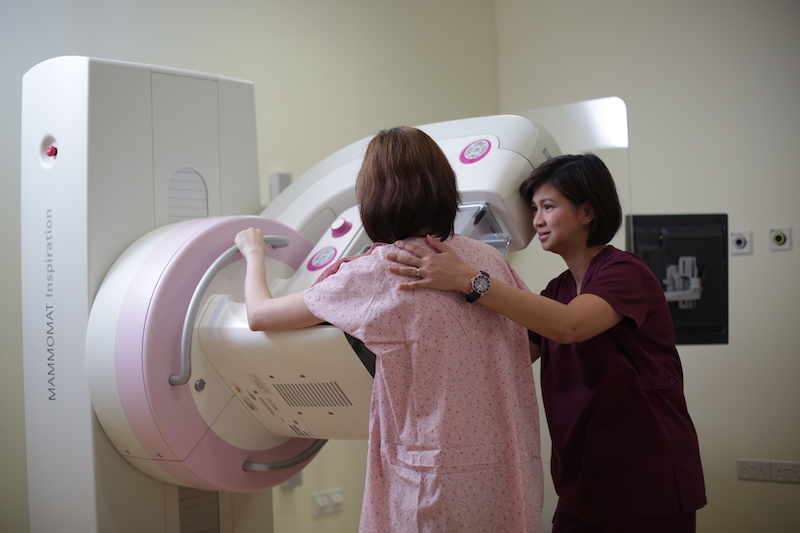Low repeat mammogram rate among Singaporean women
Women over 50 are encouraged to go for their mammogram once every two years.
 The latest statistics from Breast Screen Singapore (BSS) reveal that most women above 50 do not follow up on their repeat breast screen two years after their first mammogram.
The latest statistics from Breast Screen Singapore (BSS) reveal that most women above 50 do not follow up on their repeat breast screen two years after their first mammogram.
In 2014, 6,550 women above the age of 50 had their first mammogram. In 2016, only 889 or 13.6 percent of them returned for their second mammogram. This worrying trend held true for 2015 and 2016. In 2015, 7,495 had their first mammogram, but only 1,395 or 18.6 percent were re-screened in 2017, according to the Health Promotion Board. In 2016, 8,598 went for their first mammogram, but 18.4 percent or 1,586 were re-screened in 2018.
Doctors caution that an absence of abnormality in the first mammogram does not mean this will be the case in subsequent breast screening mammograms.
“Although we are encouraged by the rising number of women who went for their first mammogram, we are concerned that a significant proportion did not return for their subsequent screen. For any health screening to be effective, it cannot be a one-off event,” said Dr Chan Ching Wan, Chairman of Breast Cancer Awareness Month (BCAM) 2019.
She added: “Regular breast screening in particular is important because it allows for early detection of most breast cancers, and we know that treatment of early stage breast cancer has far better outcomes.” For instance, for those in Stage 1 where the cancer is confined to the organ it is discovered in have a higher rate of survival rate than Stage 4, when other parts of the body unrelated to where the cancer began has been affected (see survival rates below).
| Stage | Stage explanation | 10- to 15-year survival rate | Treatment (Tailored based on patient’s condition and risk assessment by doctor) |
|
0 |
95 percent |
• Surgery
• Radiation (if breast conserving surgery is performed) • Hormonal treatment (depends on risk assessment by doctor) |
|
|
1 |
Cancer is confined to the organ it is discovered in |
90 percent |
• Surgery
• Chemotherapy (depends on risk assessment by the doctor) • Radiation (if breast conserving surgery is performed) • Hormonal treatment (for hormone receptor positive breast cancer) |
|
2 |
Limited spread to the region around the organ.
|
75 to 80 percent |
• Surgery
• Chemotherapy (depends on risk assessment by the doctor) • Radiation (if breast conserving surgery is performed, or based on risk assessment by the doctor) • Hormonal treatment (for hormone receptor positive breast cancer) |
|
3 |
Extensive spread to the region around the organ.
|
40 to 50 percent |
• Surgery
• Chemotherapy • Radiation (if breast conserving surgery is performed, or based on risk assessment by the doctor) • Hormonal treatment (for hormone receptor positive breast cancer) |
|
4 |
Has affected other parts of the body unrelated to where the cancer began.
|
5 to 10 percent |
• Chemotherapy
• Radiation • Hormonal treatment (for hormone receptor positive breast cancer) |
Breast cancer continues to top the list of being the most common cancer among Singaporean women, with one in 14 women suffering from the condition before the age of 75. Every year, it kills more than half a million women worldwide. In Singapore, there were 991 breast cancer deaths in 2018.
The theme for BCAM 2019 is “Make the Breast Choice – What Every Woman Needs to Do” with a strong call for women to take action.
“Knowing what needs to be done is not good enough. The key is to start taking action and responsibility for one’s own health by making an appointment for the first mammogram or repeat screen. Mammogram is by far the most reliable screening tool for breast cancer,” said Dr Samuel Ow, vice-chairman of BCAM 2019. He is also a consultant with the Department of Haematology-Oncology, National University Cancer Institute, Singapore (NCIS).
He emphasised that women above 50 should go for their mammograms once every two years.
In Singapore, 20 percent and 10 percent of the breast cancer patients were diagnosed at Stage 3 and 4 respectively due to poor screening uptake – the cancer was not picked up during mammogram but through complaints to doctors such as breast lumps or other breast abnormalities.
Dr Chan, who is also a senior consultant with the NCIS Division of Surgical Oncology, added, “In our practice, we often see patients who did not go for screening because of misconceptions and unfounded fears about mammograms and breast cancer. Breaking a cancer diagnosis is always difficult, but it is particularly regrettable in cases where we know it could have been picked up and treated much earlier, if the patients have not been held back by unscientific claims.”
(** PHOTO CREDIT: National University Cancer Institute, Singapore (NCIS))
| ** Mammogram screenings: Organised by Breast Cancer Foundation at: 1) Kallang Leisure Park (open-air carpark) on September 28 and 29 from 9am to 4pm.2) Singapore Sports Hub, OCBC Square on October 5 from 1pm to 8pm.There is also a S$25 funding assistance for your mammogram screening at participating breast screening centres from October 1, 2019 to January 31, 2020. Book your appointment by November 30, 2019 and attend your screening by January 31, 2020. For more information, please visit http://www.bit.ly/scsbcam2019. Breast cancer public forums: 2) Organised by Tan Tock Seng Hospital (TTSH) on October 5 at TTSH at 9am to 12pm. To register, please e-mail: pamela_jw_yeo@ttsh.com.sg or call 6357 7835 [office hours: please avoid 12 to 2pm] – SMS/WhatsApp to 9828 9344 [BCAM19<SPACE>No. of Pax<SPACE>Email Address]. |

0 Comments